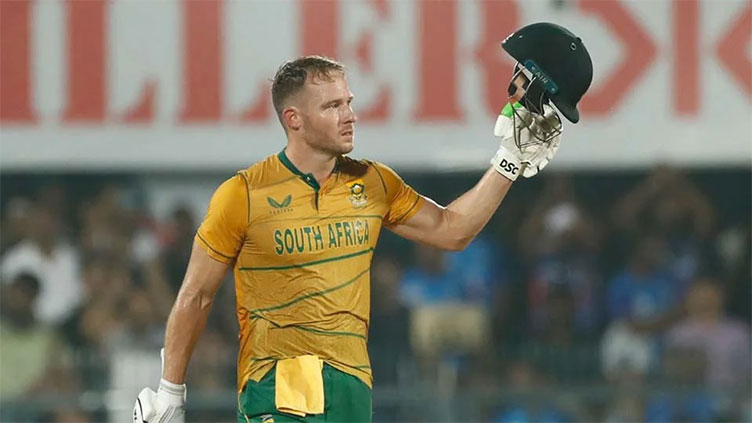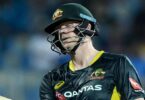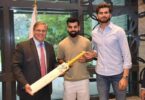NEW DELHI (Agencies): Here we go again. South Africa at the Cricket World Cup. It’s been one sorry story after another.
Dropped bats, rain drops, poor maths and teams that were less than the sum of their parts have all added up to a one of the most disappointing and baffling records in sport.
Yet hope once again springs forth.
A 3-2 series triumph over Australia that saw the side win the final three games on the bounce has injected a feel-good energy into South African cricket.
History cautions against them getting carried away, but it’s tantalising to imagine that this time, at long last, the Proteas can finally fulfil their destiny.
“We genuinely believe that we can do something special,” says David Miller, the powerful middle-order batter who, at 34, is also a senior figure in the group. “The reality is we haven’t won a World Cup so there’s no point brushing that under the carpet.
“But personally I don’t live with those things on my shoulders. The past is the past. It doesn’t impact me at all. It’s about what’s in front of you…the next ball, your next moment.
“I know the other guys are in the same mindset. We’re looking at it as a chance to create history. What a brilliant opportunity this is. If we play well, we know we’ve got a helluva chance.”
South Africa go into the tournament as the fourth-ranked side according to the ICC’s metrics, but with five batters in the top 15.
No other side has more than three in this elite cluster and Miller, 15th on that list, is backing his batting team-mates to come good in India.
“We have performed consistently well over the past four years,” adds Miller. Indeed they have. Since the last World Cup, only six batters have scored more than 1,000 runs at a strike-rate above 100. Three of them – Miller, Heinrich Klaasen and Aiden Markram – are South African.
In that time both Rassie van der Dussen and captain Temba Bavuma have averaged north of 50 and Quinton de Kock, who will retire from the format after the tournament, has done enough to retain his place in the top 10 of the ICC’s rankings.
“I’m not personally a stats-driven guy,” says Miller, who has averaged 60.7 with a strike-rate of 114.15 over the last World Cup cycle.
“But it’s good to look at the numbers and know that the work we’ve been putting in has produced some positive contributions. “For me it’s about making a situational impact. Can I take the game on? Can I see a chase home? That’s where games are won and lost. I think we’ve proved some people wrong.
“Take Temba [Bavuma]. He’s had so much flak from a lot of people and he’s basically just shoved it right back in their faces. He’s a terrific captain and a phenomenal player in this format. It’s a strong line-up. We back ourselves to compete with the bat.”
This should be a warning to their rivals, having been short of runs four years ago in England.
They were led by Faf du Plessis, who was also embroiled in a selection scandal involving AB de Villiers in the build-up as he was left out of the squad after an attempt to return following retirement. Their bowlers did what they could, but a disjointed and dispirited campaign ended in a seventh-placed finish in the 10-team league.
Now with in-form batters and a captain that has fostered a cohesive culture, their bowlers – despite the loss of Anrich Nortje – have all the tools to deliver on their promise.
Spin will play a crucial role on turning tracks and the Proteas are uncharacteristically blessed with two elite tweakers.
Tabraiz Shamsi’s left-arm wrist spin will occasionally haemorrhage runs, but it can equally rip through an aggressive batting side.
At the other end Keshav Maharaj has replicated his nous with a red ball to provide stability and control.
The 33-year-old took eight wickets in four games against Australia, including 4-33 in the final match in Johannesburg, while conceding a miserly 4.07 runs per over.
“We’ve been playing together since we were 11,” Miller says of his Dolphins team-mate Maharaj.
“It’s actually an inspiration watching his progress. He’s ‘Mr Consistency’. He’s such an important player for us.”
South Africa will be without the express pace of Nortje. Arguably the quickest bowler in the game, the 29-year-old couldn’t shake off a persistent back problem and will miss out on his second consecutive World Cup.
Luckily the team’s pace reserves are well-stocked and this tournament could be the making of the 6ft 8in tall Marco Jansen, who delivers swinging balls from a lanky left arm.
He will also have to do a job with the bat at number seven given the lack of a high-quality all-rounder, but it’s Jansen’s knack of knocking over top-order batters that will be most needed.
This could also be a seminal tournament for Kagiso Rabada. Now 28, he’s yet to marry his generational talent with a standout performance at a major white-ball event. If Rabada performs to his ability then South Africa have every chance of taking 10 wickets per game.
“We know that things haven’t been great in South African cricket all the time,” adds Miller, referencing the disappointing fortunes of the Test side and the lingering aftertaste of the Social Justice and Nation-Building Hearings that unearthed systemic racism in the sport in 2021.
“But [new coach] Rob [Walter] has emphasised that we’re representing a proud country and we have a chance to unite people through sport.
“We take that very seriously. The language and energy is really positive. We just can’t wait to get stuck in and give it horns.”







